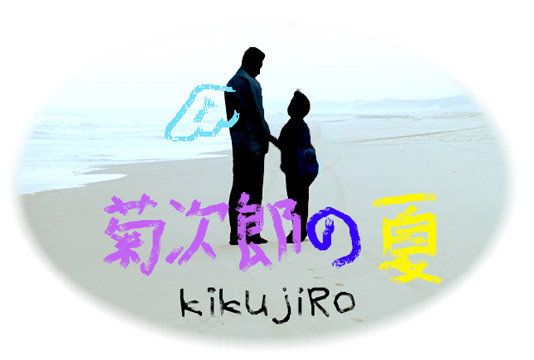

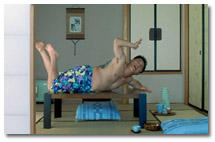 Iíll come clean right away, this is my favorite movie, period. There will be no use hiding my love for this film so letís just get that settled. I firmly believe that no other film of any other genre will strike me quite the same way that Kikujiro has and continues to do with each and every viewing. Having said that, I still donít think it could be considered a Ďperfectí film (if there is such a thing) because there is no way that it can be appreciated on the same level as someone from America as it might be by a Japanese citizen. Hopefully as we move along youíll begin to understand exactly what I mean by that a little better. I will also make a serious effort to avoid oozing flowery words of praise over the film. It's a really, really wonderful film but I'll attempt to be as objective as possible. Now then, first things first letís talk about the genesis of this masterpiece...oops, I mean 'movie'.
Iíll come clean right away, this is my favorite movie, period. There will be no use hiding my love for this film so letís just get that settled. I firmly believe that no other film of any other genre will strike me quite the same way that Kikujiro has and continues to do with each and every viewing. Having said that, I still donít think it could be considered a Ďperfectí film (if there is such a thing) because there is no way that it can be appreciated on the same level as someone from America as it might be by a Japanese citizen. Hopefully as we move along youíll begin to understand exactly what I mean by that a little better. I will also make a serious effort to avoid oozing flowery words of praise over the film. It's a really, really wonderful film but I'll attempt to be as objective as possible. Now then, first things first letís talk about the genesis of this masterpiece...oops, I mean 'movie'.
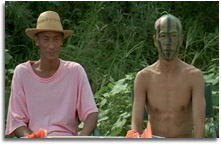 Yakuza, violence and guns. If youíre not talking about Show Aikawa or Riki Takeuchi, that leaves only one man, Beat Takeshi. Famous as a Director around the world, his knack for capturing unapologetic violence and death on film, usually by means of stories that involve Japanís infamous gangsters, here Takeshi brings us the story of a boy searching for his mother. Should something like Kikujiro really have come as such a big surprise? Look through his portfolio and youíll see that long before Kikujiro, Takeshi had dabbled in drama here and there even prior to the motorbike Ďaccidentí in August 1994 that almost killed him and supposedly changed his outlook on life. What does make Kikujiro unique among standard Takeshi-fare are the colors and lasting moments of joy seen in the film. Although Kids Return had itís Ďupliftingí moments. many of those came at the cost of something dear to the individual.
Yakuza, violence and guns. If youíre not talking about Show Aikawa or Riki Takeuchi, that leaves only one man, Beat Takeshi. Famous as a Director around the world, his knack for capturing unapologetic violence and death on film, usually by means of stories that involve Japanís infamous gangsters, here Takeshi brings us the story of a boy searching for his mother. Should something like Kikujiro really have come as such a big surprise? Look through his portfolio and youíll see that long before Kikujiro, Takeshi had dabbled in drama here and there even prior to the motorbike Ďaccidentí in August 1994 that almost killed him and supposedly changed his outlook on life. What does make Kikujiro unique among standard Takeshi-fare are the colors and lasting moments of joy seen in the film. Although Kids Return had itís Ďupliftingí moments. many of those came at the cost of something dear to the individual. 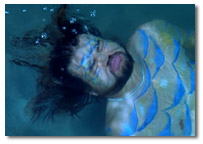 Now donít worry, I wonít spoil anything because there are plenty of emotions along the road of Kikujiro, but the ending is probably the brightest moment in any Takeshi film, that is to say, outside of the in-your-face theater-shaking festival tap-dance extravaganza in 2003ís Zatoichi. But enough intro, more on all that good stuff later. Letís look at the film itself shall we? Just so you know Iím not going into much detail about the characters or the story. Thatís something I think is best enjoyed on a personal level and I donít want you heading into the film with any expectations. It would be best if you could enjoy it for what it is or isnít through your own eyes.
Now donít worry, I wonít spoil anything because there are plenty of emotions along the road of Kikujiro, but the ending is probably the brightest moment in any Takeshi film, that is to say, outside of the in-your-face theater-shaking festival tap-dance extravaganza in 2003ís Zatoichi. But enough intro, more on all that good stuff later. Letís look at the film itself shall we? Just so you know Iím not going into much detail about the characters or the story. Thatís something I think is best enjoyed on a personal level and I donít want you heading into the film with any expectations. It would be best if you could enjoy it for what it is or isnít through your own eyes.
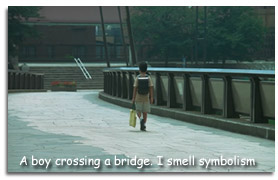 Summer vacation lasts but a few short weeks in Japan. Itís a time when families go on trips to the shore, attend fireworks festivals and maybe even visit relatives. Unfortunately, nine-year old Masao (Yusuke Sekiguchi) doesnít have anywhere to go and no one left to play with. Ever since he could remember, Masao lived in Tokyo with his grandmother. His father died in an accident when he was still too young for solid memories and this resulted in Masao falling under his grandmotherís wing while his mother worked far from the city in Aichi prefecture. Left with no memories of his mother, bullied by older kids and only enough friends to count on one hand, Masao is a quiet and contemplative child who doesnít say much and does what heís toldÖmost of the time anyway. Finding out that even his soccer practices are cancelled during the vacation, he spends a day trying to find a few of his friends to play with only to discover they're all leaving home for vacation. Masao finds himself with much free time while his grandmother works her part-time job at a lunch-stand but when a package from his mother comes, by chance Masao finds a photo of her with him as a baby during a shrine visit. Suddenly, Masao becomes determined to meet his mother and packs a backpack with his summer scrapbook, a few other belongings and without hesitation runs off to find his mother!
Summer vacation lasts but a few short weeks in Japan. Itís a time when families go on trips to the shore, attend fireworks festivals and maybe even visit relatives. Unfortunately, nine-year old Masao (Yusuke Sekiguchi) doesnít have anywhere to go and no one left to play with. Ever since he could remember, Masao lived in Tokyo with his grandmother. His father died in an accident when he was still too young for solid memories and this resulted in Masao falling under his grandmotherís wing while his mother worked far from the city in Aichi prefecture. Left with no memories of his mother, bullied by older kids and only enough friends to count on one hand, Masao is a quiet and contemplative child who doesnít say much and does what heís toldÖmost of the time anyway. Finding out that even his soccer practices are cancelled during the vacation, he spends a day trying to find a few of his friends to play with only to discover they're all leaving home for vacation. Masao finds himself with much free time while his grandmother works her part-time job at a lunch-stand but when a package from his mother comes, by chance Masao finds a photo of her with him as a baby during a shrine visit. Suddenly, Masao becomes determined to meet his mother and packs a backpack with his summer scrapbook, a few other belongings and without hesitation runs off to find his mother! 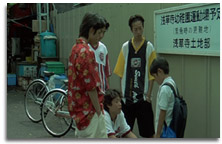 The music swells as our little hero races through the streets and abruptly comes to a halt just down the street where he finds himself at the mercy of the neighborhood bullies trying to get some cash out of him. Luckily for Masao the one thing scarier than bullies comes to his aid, a middle-aged Japanese married woman. A friend of Masaoís grandmother and the owner of a local pub, she berates the young punks with an iron tongue and gets Masaoís money back. Seeing Masao as if heís ready for an expedition she inquires where heís off to and he honestly replies that he wants to go see his mother. Understanding the boyís situation she decides to help make his dream come true and volunteers the one man who has enough free time to aid him in his quest, her husband (Beat Takeshi). A failed yakuza and all-around loser at life; he doesnít know much and in his middle-age finds himself less the dominant male and more of an indentured servant to his wife. When his wife waves $500 in his face and asks him to escort the boy to Aichi she ends up creating an unlikely and fated combination. What they will experience in a few weeks ends up being more than most people experience in half their life and the important memories that Masao adds to his scrapbook along the journey will surely never be forgotten.
The music swells as our little hero races through the streets and abruptly comes to a halt just down the street where he finds himself at the mercy of the neighborhood bullies trying to get some cash out of him. Luckily for Masao the one thing scarier than bullies comes to his aid, a middle-aged Japanese married woman. A friend of Masaoís grandmother and the owner of a local pub, she berates the young punks with an iron tongue and gets Masaoís money back. Seeing Masao as if heís ready for an expedition she inquires where heís off to and he honestly replies that he wants to go see his mother. Understanding the boyís situation she decides to help make his dream come true and volunteers the one man who has enough free time to aid him in his quest, her husband (Beat Takeshi). A failed yakuza and all-around loser at life; he doesnít know much and in his middle-age finds himself less the dominant male and more of an indentured servant to his wife. When his wife waves $500 in his face and asks him to escort the boy to Aichi she ends up creating an unlikely and fated combination. What they will experience in a few weeks ends up being more than most people experience in half their life and the important memories that Masao adds to his scrapbook along the journey will surely never be forgotten.
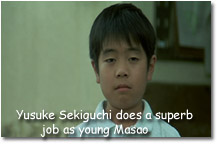
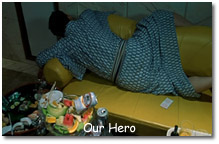 Takeshiís role here is at last something refreshingly close to the character we see on television. As expressed in his film Takeshisí, there seem to be a lot of people inside the real Takeshi and his films became overwrought with ĎTakeshi the Dead-Pan Killer Yakuzaí. No one can say who the real Takeshi is but at least this is the grand film debut of ĎTakeshi the Dimwit Pranksterí whoís seen on variety programs almost weekly in Japan. In exchange for this warm character with his onscreen acts of ill-fated overconfidence and manzai-like connection to every sub-character in the film, he sacrifices the mysterious and conflicting character some of us have grown accustomed to. As with Yusukeís performance some might complain that this makes for a weak film but thereís no reason for Takeshi to create that kind of film with this material. Here, Takeshi steps into the role of Homer Simpson, a loser with a good heart somewhere deep beneath the layers of failure. Not anything terribly new Iíll admit but itís a character all of us know something about because they exist in part of us. We can laugh at Takeshiís predicaments because at one point in our life, weíve all been there before. Thatís why the filmís more poignant scenes hit close to home.
Takeshiís role here is at last something refreshingly close to the character we see on television. As expressed in his film Takeshisí, there seem to be a lot of people inside the real Takeshi and his films became overwrought with ĎTakeshi the Dead-Pan Killer Yakuzaí. No one can say who the real Takeshi is but at least this is the grand film debut of ĎTakeshi the Dimwit Pranksterí whoís seen on variety programs almost weekly in Japan. In exchange for this warm character with his onscreen acts of ill-fated overconfidence and manzai-like connection to every sub-character in the film, he sacrifices the mysterious and conflicting character some of us have grown accustomed to. As with Yusukeís performance some might complain that this makes for a weak film but thereís no reason for Takeshi to create that kind of film with this material. Here, Takeshi steps into the role of Homer Simpson, a loser with a good heart somewhere deep beneath the layers of failure. Not anything terribly new Iíll admit but itís a character all of us know something about because they exist in part of us. We can laugh at Takeshiís predicaments because at one point in our life, weíve all been there before. Thatís why the filmís more poignant scenes hit close to home.
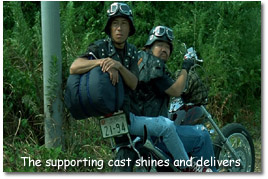 Ah, the supporting cast. I believe it may be possible to write three pages describing characters that appear onscreen in some cases for only a moment or so. If youíre a fan of Takeshi films then you should be pleasantly surprised at who pops up. Takeshiís onscreen wife played by Kayoko Kishimoto, reprises such a role in a nod to Takeshiís Hanabi. Masaoís mother, Yuuko Daike can be seen in Takeshiís Zatoichi as one of the traveling geisha sisters. Famous model and actress (at the time) Fumie Hosokawa shows up as the ĎJuggling Girlí. Takeshi Gundan members also arrive in full-force; Great Gidayu and Rakkyo Ide take on the roles of the capricious bikers. It also deserves to be said that Yoji Tanaka also briefly shows up. Name not familiar? I promise you know who he is. He was Crazy 88 #3 aka Yoji Boba Tanaka. Yoji takes an interesting spot here. Although heís appeared in a few films with Takeshi it seems that he may very well have filled the place of tough-guy regular
Ah, the supporting cast. I believe it may be possible to write three pages describing characters that appear onscreen in some cases for only a moment or so. If youíre a fan of Takeshi films then you should be pleasantly surprised at who pops up. Takeshiís onscreen wife played by Kayoko Kishimoto, reprises such a role in a nod to Takeshiís Hanabi. Masaoís mother, Yuuko Daike can be seen in Takeshiís Zatoichi as one of the traveling geisha sisters. Famous model and actress (at the time) Fumie Hosokawa shows up as the ĎJuggling Girlí. Takeshi Gundan members also arrive in full-force; Great Gidayu and Rakkyo Ide take on the roles of the capricious bikers. It also deserves to be said that Yoji Tanaka also briefly shows up. Name not familiar? I promise you know who he is. He was Crazy 88 #3 aka Yoji Boba Tanaka. Yoji takes an interesting spot here. Although heís appeared in a few films with Takeshi it seems that he may very well have filled the place of tough-guy regular 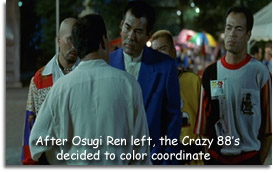 Susumu Terajima who has been with Takeshi in almost every production, some not even directed by him, except Kikujiro. If it isn't an all-star cast then it is at least one with a lot of heart. Although the choice of Fumie Hosokawa might raise a few questions as to whether Takeshi was just trying to use a popular icon or not, she carries herself skillfully and is neither overused or left onscreen uselessly. Oh, and a special treat that meets the light atmosphere of the film, the infrequently seen other half of Takeshiís Two Beat comedy duo, Beat Kiyoshi also makes a very funny cameo that is sure to bring up memories of their past as stage performers together.
Susumu Terajima who has been with Takeshi in almost every production, some not even directed by him, except Kikujiro. If it isn't an all-star cast then it is at least one with a lot of heart. Although the choice of Fumie Hosokawa might raise a few questions as to whether Takeshi was just trying to use a popular icon or not, she carries herself skillfully and is neither overused or left onscreen uselessly. Oh, and a special treat that meets the light atmosphere of the film, the infrequently seen other half of Takeshiís Two Beat comedy duo, Beat Kiyoshi also makes a very funny cameo that is sure to bring up memories of their past as stage performers together.
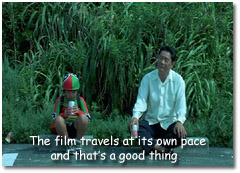 I mentioned above that Kikujiro is a film that cannot easily be appreciated by individuals from Japan on the same level as those from America. Thatís because, and Iím being brutally honest, the film is very bland...for someone from Japan that is. Itís a series of events with a few comedic situations thrown in and a heart-warming tale placed at the core. I canít imagine sitting through the meditative story as a Japanese citizen without my eyelids growing heavy. Why? Imagine sitting through a film about a boy traveling with someone that isnít his father to see his mother from Atlanta to Chicago by any means possible. Guess what? Chances are you did and it was called Dutch. If you hated the film I need say no more. If you enjoyed the film then take out the wild comedy scenes and replace them with subtle Japanese stage humor, add a fair share of heart and long Takeshi-style shots. Thatís Kikujiro if youíre Japanese. I also mentioned before that the characters are not far removed from reality. Little Masao isnít all that uncommon in any given elementary school while everyone who watches television in Japan has seen this Takeshi before. In short, if youíre Japanese, youíve already seen much of what Kikujiro has to offer.
I mentioned above that Kikujiro is a film that cannot easily be appreciated by individuals from Japan on the same level as those from America. Thatís because, and Iím being brutally honest, the film is very bland...for someone from Japan that is. Itís a series of events with a few comedic situations thrown in and a heart-warming tale placed at the core. I canít imagine sitting through the meditative story as a Japanese citizen without my eyelids growing heavy. Why? Imagine sitting through a film about a boy traveling with someone that isnít his father to see his mother from Atlanta to Chicago by any means possible. Guess what? Chances are you did and it was called Dutch. If you hated the film I need say no more. If you enjoyed the film then take out the wild comedy scenes and replace them with subtle Japanese stage humor, add a fair share of heart and long Takeshi-style shots. Thatís Kikujiro if youíre Japanese. I also mentioned before that the characters are not far removed from reality. Little Masao isnít all that uncommon in any given elementary school while everyone who watches television in Japan has seen this Takeshi before. In short, if youíre Japanese, youíve already seen much of what Kikujiro has to offer.
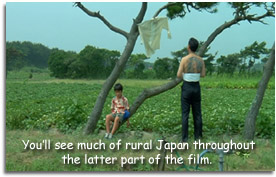 Because Kikujiro is such a plain and honest film, we can see daily life in Japan not through Takeshiís lens of violence but through the eyes of a child and a failed member of legitimate society. If you have any kind of interest in Japan just watching this movie, youíll experience the culture in a far more intimate way than any National Geographic or History Channel special. From city to countryside, Japanese bikers to sexual predators, summer festivals to the famous lottery bicycle race tracks; humor the likes of which you can only read in Japanese comics and yes, even Takeshiís terrorizing yakuza are all here. Kikujiro gushes modern Japanese culture and society. When the credits begin to roll you may find yourself blinking and staring around the room surprised to see itís your own.
Because Kikujiro is such a plain and honest film, we can see daily life in Japan not through Takeshiís lens of violence but through the eyes of a child and a failed member of legitimate society. If you have any kind of interest in Japan just watching this movie, youíll experience the culture in a far more intimate way than any National Geographic or History Channel special. From city to countryside, Japanese bikers to sexual predators, summer festivals to the famous lottery bicycle race tracks; humor the likes of which you can only read in Japanese comics and yes, even Takeshiís terrorizing yakuza are all here. Kikujiro gushes modern Japanese culture and society. When the credits begin to roll you may find yourself blinking and staring around the room surprised to see itís your own.

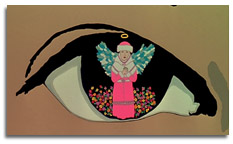 Unless a live-action film has a particularly remarkable and original soundtrack I donít find myself caring what I hear during the movie so long as it isnít horribly out of place. This is not true for many animated films. Theme songs for many animated Japanese films are often composed or performed by a vocalist or group of some prestige. In particular Studio Ghibli films are famous for their theme songs and many of them come from the composer Joe Hisaishi. He is the man responsible for megaton hits which youíll surely recognize as the main themes of films like My Neighbor Totoro, Princess Mononoke and Spirited Away. Therefore it should come as no surprise that one of the most beautiful, inspirational and moving themes Iíve ever heard is ĎSummerí, the opening and main theme of Kikujiro. Just hearing it brings back memories of friends, family and places Iíve seen and love. I know Iím drifting from the topic at hand but even if I canít say that the film is perfect, the music is the closest thing to it.
Unless a live-action film has a particularly remarkable and original soundtrack I donít find myself caring what I hear during the movie so long as it isnít horribly out of place. This is not true for many animated films. Theme songs for many animated Japanese films are often composed or performed by a vocalist or group of some prestige. In particular Studio Ghibli films are famous for their theme songs and many of them come from the composer Joe Hisaishi. He is the man responsible for megaton hits which youíll surely recognize as the main themes of films like My Neighbor Totoro, Princess Mononoke and Spirited Away. Therefore it should come as no surprise that one of the most beautiful, inspirational and moving themes Iíve ever heard is ĎSummerí, the opening and main theme of Kikujiro. Just hearing it brings back memories of friends, family and places Iíve seen and love. I know Iím drifting from the topic at hand but even if I canít say that the film is perfect, the music is the closest thing to it.
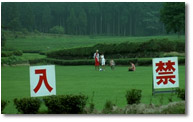 I donít know if you could call the above a review or just a fanís love-letter to the film. Iíve tried very hard to point out any negative aspects Iíve noticed with the film and I fully realize that Iím watching it through the rose-colored glasses of a foreigner who loves Japan. However, I donít have any second thoughts about calling this my absolute favorite movie and that makes me certain of its magic. I couldnít name a favorite actor or actress, food, brand of milk, book or television show if I tried but, I do know Kikujiro is my favorite film and I believe even though this might not be yours, chances are quite good it will find a comfortable spot somewhere high on your list.
I donít know if you could call the above a review or just a fanís love-letter to the film. Iíve tried very hard to point out any negative aspects Iíve noticed with the film and I fully realize that Iím watching it through the rose-colored glasses of a foreigner who loves Japan. However, I donít have any second thoughts about calling this my absolute favorite movie and that makes me certain of its magic. I couldnít name a favorite actor or actress, food, brand of milk, book or television show if I tried but, I do know Kikujiro is my favorite film and I believe even though this might not be yours, chances are quite good it will find a comfortable spot somewhere high on your list.